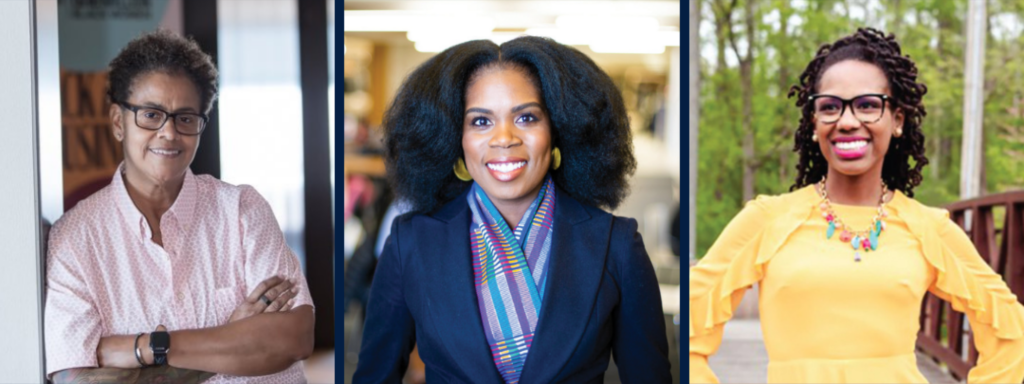The Georgetown University Black Alumni Council held a conversation to discuss scholarship and activism as Black woman scholars and leaders in academia during a time of heightened calls for racial justice.
The event, titled “The Intersection of Academy and Activism: A Critical Conversation with Black Leaders and Scholars,” was held Sept. 20 as a part of the Critical Conversation Series, a series of talks that has been hosted over the past few months by the Black Alumni Council. Speakers discussed their personal experiences, offering anecdotes and advice to students about being a Black woman leader in higher education.
The event featured Dr. Nadia Brown, professor of government, chair of the women’s and gender studies program and affiliate in the African American studies program, Dr. Adanna Johnson, associate vice president for Student Equity and Inclusion and leader of the Office of Student Equity and Inclusion, and was moderated by McDonough School of Business Professor Melissa Bradley (MSB ’89).
Brown said she developed a new mission statement while working in political science that no longer attempts to validate Black women’s political experiences, but rather focuses on their sense of belonging.
“My mission statement in this work lately has been I belong here, and stepping into that fully, I want other people to see that themselves: that they belong here too,” Brown said during the event. “While there are systems that try to push people out, or make you feel other, or unwelcome or marginalized, I think we need to take space, and make space for other people, because I would not be here, if it weren’t others, and I want others to be here once I am no longer here.”
At the event, Bradley said Black employees make up fewer than 10% of higher education professionals and just 8% of all administrators. Black women make up only 2.1% of tenured associate or full professors at U.S. universities, and at Georgetown, 2.8% of tenured professors are Black women.
Johnson spoke about the isolating effects of these statistics and said women, and more specifically, Black women, have to navigate racist and sexist academic spaces in order to get tenure and full professorship, despite their qualifications and research expertise.
“I will say that as an administrator, when you speak to those statistics, which I see the presence of every day, it feels even more isolating in a position of leadership,” Johnson said at the event. “It’s really hard because you don’t always have folks that you can talk to, because you’re sort of at the top of of your department and people are looking to you to navigate challenges, to problem solve for some of the things that they face related to bias discrimination barriers.”

Brown says that it is important to prioritize mental health amid the burnout that activism and work as a Black woman leader and scholar in higher education can cause.
“I find it really important to take meticulous care of myself, as a Black woman. Often we are expected to save ourselves for last, if at all, and prioritizing the work for some of us has meant not prioritizing ourselves at all,” Johnson said. “I prioritize taking care of myself every single day, consistently, unapologetically, and I know that prioritizing my spiritual, mental and physical well being allows me to show up better for my family, my community and my work here at Georgetown.”
Brown said that as a Black feminist, it is necessary to prioritize intersectional advocacy on both gender-based and racial issues.
“As a methodology, my work is about liberation, right?” Brown said. “You can’t be an Africana scholar and not care about your people and writing work that is not libratory, and so it comes and looks at different forms. There’s always work to be done, and that sets your research agenda.”
Johnson said her experiences in the past four years working at Georgetown highlighted the important work of students, in addition to faculty and leaders, in promoting diversity on campus.
“I’ve seen our students work in ways, like with the Black Survivors Coalition, to change the landscape of what our colleagues look like in the counseling center, it’s a much more diverse place than when I started,” Johnson said.
Brown said she recognizes the importance of showing Black women their potential to be leaders in higher education.
“I think my biggest flex as a professor is that I am teaching the next generation of students,” Brown said. “There are just so few Black professors, there are such few Black women professors, that my job isn’t to create little mes, my job is to show them the possibilities so that they can create themselves.”














